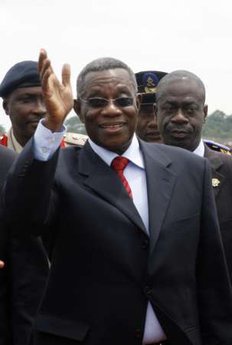
The state of Ghana does not reflect its potential. The simple truth is that Ghana does not compare favourably to countries that are less endowed with resources –human and natural. The problem is the kind of leadership? this country has and continues to endure.
During the 2008 electioneering campaign, President Mills promised that he will hit the ground running should the NDC win the elections. By his second State of the nation's address, the president had adopted a new slogan: “Slow but sure”, trying to indicate that the slowness of his government is a virtue and he will surely fulfill his campaign promises. It appears that the president, despite the crises that is facing the majority of our people in relation to education, healthcare, housing, water, etc., there is no urgency. Obviously, we cannot expect urgency from those who are now occupying positions which insulate them from the crises most Ghanaians go through daily.
We all know that the Mills government inherited a political regime that was structured to satisfy personal, parochial, and partisan interests first. Meeting the national interest is secondary and only a side-show for those in power because the political system is controlled and operated by, and in the interest of corrupt and greedy elite. Unless this situation changes, there cannot be any meaningful change in the conditions of the people.
President Mills made Ghanaians expect that he understands the problem and would provide the sterling leadership required to change the situation. How his government is responding to long standing challenges provides the evidence of his abilities to deal with them. He does not need foreign exchange or any more time, as he keeps pleading, to show what he is capable of.? So Far, Not So Good.
The people changed the NPP government of President Kufuor to bring NDC to power because they wanted change. President Mills created an impression that he could deliver, the change they were looking for. It appears the Mills regime is now comfortable with what it inherited from the NPP and seems bent on maintaining the status quo.
Interestingly, President Mills still wants Ghanaians to believe that it can deliver on its 2008 campaign promise of “CHANGE, for a better Ghana”. They must think again because Ghanaians are no more so gullible. Fulfilling campaign promises is not worthy of mention if it does meet the reasonable expectations of the people.
The Constitution of Ghana grants the President and his\her government reasonable powers, which must be exercised to create the political space for implementing programs that are in the interest of the nation. It is the expectation of the people that these powers are exercised to clear the political landscape of corruption, incompetence, and greed. The Presidency must ensure that we have institutions that Ghanaians can believe in. Maintaining the status quo of dysfunctional institutions headed by corrupt and incompetent public officials, who have no sense of duty as public servants, and are insulated from the crises facing the public, is the cause of the ''go-slow'' government of President Mills.??
Elected officials come only to continue the same practices they promised to change. This is fraud.
Due to the current government's lethargic approach to the fight against corruption, many of those who, after the last elections feared that they may be prosecuted for corruption and went into hiding are now back, more emboldened by what they see and even dare to call the government names.
Ghanaian excellence is evident anywhere else, except in their beloved country Ghana.? Bad leadership has been the problem. When access to public office is achieved through spins and misrepresentations, the leadership that emerges cannot be credible.
President Mills has created the government he is comfortable with and we must hold him accountable for what happens under his rule. We have a duty to our country Ghana and the majority who continue to be victims of elite incompetence, corruption and greed. We should not be deceived by partisan labels when the character of political regimes and the impact on the people remains the same.
When public institutions and their behaviour remain as they were, no meaningful change can occur. It is like redenomination without a change in the fundamentals: THE VALUE IS THE SAME!!! ?? FROM THE TALK